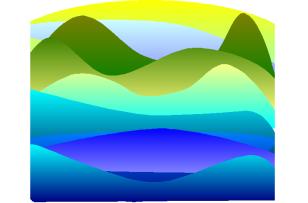|
CONFERENCE
REPORT
|
|
New technologies and methodologies for control systems play a significant role on the development of surface vessels, floating structures, sub-sea vehicles, and other devices within the marine environment. Modelling, simulation, advanced control and artificial intelligence techniques can improve performance, reliability, security, economy and ecology of marine systems. The aim of the IFAC Conference on Control Applications in Marine Systems, held in Ancona, Italy, on July 7-9 2004, was to highlight all these topics, present the state of the art and the current research activities and advances in this field, establish the lines of innovative activities and analyse the transfers of innovative solutions to the industrial production marine systems. This Conference was sponsored by the IFAC Technical Committee on Marine Systems. Local sponsorships come from the Università Politecnica delle Marche, Ancona, the Calzoni S.r.l, Milan, the Fincantieri - Cantieri Navali Italiani S.p.A., Trieste, Italy, the International Shipyards Ancona, Ancona, Italy, the National Instruments, Milan, Italy and the Rockwell Automation, Milan, Italy. The Conference attracted 120 participants from 20 different countries with experts of the theory and applications of automatic control for the maritime systems, coming from Universities and Industries, both senior and junior researchers; about 20 participants were technicians coming from industries and more than 20 participants were PhD students. From 92 papers received, 75 were accepted for oral presentation of which 72 were presented at the Conference. An electronic copy in a CD-ROM and an hard copy in a book of the conference preprints were provided at each participant. All papers presented at the conference appear in the Proceedings recently published by Elsevier (ISBN 0 08 044169 6; ISSN 1474-6670). The papers range from total control and modelling of vessels, underwater vehicles, off-shore structures to detailed control and modelling of ancillary and auxiliary subsystems. The conference was organised in 20 technical sessions, from which 8 sessions were focused on surface vessels, 6 sessions on underwater vehicles, 3 sessions on control and modelling of ancillary and auxiliary subsystems, 2 sessions on off-shore structure and 1 session on cooperative marine systems. The following six distinguished speakers were invited to present plenary papers: “Autonomous Underwater Vehicles for Scientific and Naval Operations” by Professor Edoardo Bovio, NATO Undersea Research Centre, Italy; “Some Recent Development of Next Generation’s Marine Traffic Systems” by Professor Kazuhiko Hasegawa, Osaka University, Japan; “Italian Navy Trends in Automation of Ship Controls” by Rear-Admiral Dino Nascetti, Italian Navy, Italy; “Structural Issues in the Design of Marine Control Systems” by Professor Asgeir Johan Sørensen, Norwegian University of Science and Technology, Norway; “Aspects of Industrial Dynamic Positioning: Reality-tolerant Control” by Dr Richard Stephens, ALSTOM Power Conversion, UK; “Design of Robust Shipboard Power Automation Systems” by Professor Edwin Zivi, U. S. Naval Academy, Annapolis, USA. The technical programme was completed with a one-day tutorial (July 6): “Diagnosis and Fault Tolerant Control for Marine Systems” by Professor Mogens Blanke, Technical University of Denmark, Denmark. The presented regular papers and the plenary lectures fitted very well into the scope of the Conference, interesting results were discussed on the system model and identification of surface vessels and underwater vehicles, and on the hybrid and non linear control of marine systems. Innovative implementations of advanced control schemes were also presented for the industrial production marine systems. The Conference provided an excellent opportunity to meet and exchange ideas on the innovative topics of Control Applications in Marine Systems. Technical visits to local shipyards and social events were organised. The social dinner was held in the fabulous setting of the Mount Conero, in the South of Ancona, where the flat and levelled seashore is abruptly interrupted by its green vegetation merging within the deep blue of the Adriatic Sea. The Conference was also a great opportunity to visit the Marche region for discovering its historical parts and its beautiful colours: the transparency of the sea, the green of the hills and the blue of the mountains. The Conference Chairs would like to thank the international program committee, all authors and plenary speakers for a very interesting technical and scientific program. We are looking forward to the next CAMS conference planned for 2007 in Croatia. |
IFAC
Conference on
Control Applications in Marine Systems
CAMS
2004
Ancona,
Italy
July
7-9, 2004

